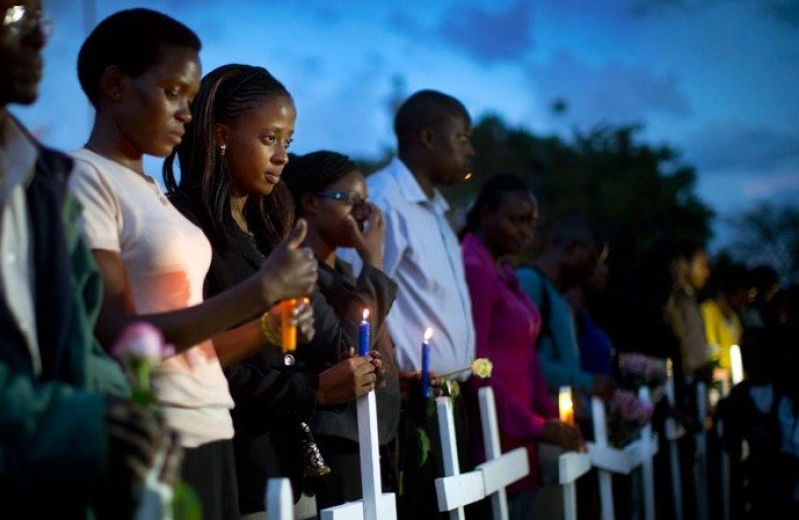
A relative at the burial of a Christian mother of three who died in detention in Eritrea told Morning Star News her body showed signs of torture that could have contributed to her death.
Eritrean authorities arrested Fikadu Debesay and her husband in the southern town of Adi Quala as part of a crackdown in May, when at least 122 Christians were detained for worshipping in unregistered churches. Early this month she died in detention north of the capital, Asmara, at Metkel Abiet, a camp in the Northern Red Sea Region, where prisoners are held in harsh desert heat.
"It has been very difficult consoling the children," a relative caring for the couple's children told Morning Star News. "They want to know what happened to their mother."
The relative said that one of the children remarked, "Our parents were picked up by unknown people while we were praying at home, only for our mum to come back in a coffin. Where is our dad?"
The traumatized children are restless, have trouble sleeping at night and frequently scream, the source said.
At Debesay's burial in Mendefera on Aug. 10, mourners noted an unusual scar on her face, as well as another scar on her left hand, "which could have been a sign of some mistreatment or intense sunburn that resulted to her untimely death," the relative told Morning Star News.
"We request prayers and financial support for the children," the source added.
Christians practicing their faith secretly in homes - outside the officially sanctioned Orthodox, Catholic and Evangelical Lutheran denominations, along with Sunni Islam - have been the target of arrest and imprisonment in cruel conditions in Eritrea since 2002.
Eritrean President Isaias Afwerki, who has headed a communist-influenced government since 1994, has imposed a "reign of fear through systematic and extreme abuses of the population that may amount to crimes against humanity," according to a United Nations panel. Amnesty International estimates Afwerki has incarcerated 10,000 political prisoners, and that under his rule torture for punishment, interrogation and coercion in Eritrea is widespread.
Eritrea ranked 10th on Christian support organization Open Doors' 2017 World Watch List of the 50 countries where it is most difficult to be a Christian. Three Christians died in prison in Eritrea in 2016, according to Open Doors.
Arrests are taking place monthly, Christian Solidarity Worldwide (CSW) reported, citing the arrest of 23 Christians in Asmara during the first week of August. In July, authorities took 16 female national service conscripts in their late teens from their assignments in Adi Halo village, 20 miles from Asmara, and put them in the Metkel Abiet camp.
"Other Christians and family members who attempted to visit them were also imprisoned," according to a CSW press statement. "The detainees' hair was forcibly shaved off in what local sources describe as an additional sign of humiliation in a society where a woman's hair is regarded as a sign of decency and sanity."
Prison conditions are such that a woman rounded up from her home in Nefasit in early June was reported to have become mentally ill, according to CSW.
"It is alarming to note that conditions and treatment in detention are so inhumane that they can cause a mental breakdown," CSW Chief Executive Mervyn Thomas said in a press statement. "Clearly, human rights and fundamental freedoms continue to be violated comprehensively in Eritrea, and the situation of freedom of religion or belief is deteriorating."
The number of Christians detained in desert camps and military facilities since May has risen to 210, according to CSW. Most were detained in raids on their homes, while others were arrested at prayer meetings.
"Like Fikadu Debesay, several are parents, and according to local sources, over 50 children are currently without one or both parents as a result of these raids," according to CSW.
CSW called for the international community to maintain pressure on Afwerki's regime until all prisoners of conscience are freed without preconditions.
In the May sweep, authorities seized 45 Christians, including elderly men and a disabled woman, from their homes in Adi Quala and transported them to Adi Aglis detention camp. The arrests left 23 children without their parents, according to CSW. In Gindae town in the Northern Red Sea Region, 15 Christians were arrested, the organization said, and in Godaif District of Asmara, 17 Christians were arrested on May 28.
A week earlier, 45 Christians, mostly women, had been rounded up in another part of the city as they gathered at a party arranged by a recently married couple, CSW reported.
In her latest report to the Human Rights Council (HRC), Sheila B. Keetharuth, U.N. Special Rapporteur on Eritrea, noted that "the practice of arbitrary arrest and detention of individuals based on their religious belief continues," and she noted the continuing detention of Patriarch Antonios of the Eritrean Orthodox Church.
Open Doors notes that some Christians have been in prison for more than 11 years, some in shipping containers amid scorching heat.
"Christians are considered 'agents of the West' and a threat to the state," Open Doors reported. "Eritrean Muslims are 'Muslim first,' and leaving Islam is seen as a betrayal of their community. Many Christians would rather risk the deadly emigration routes via Sudan or Libya than stay in Eritrea."







